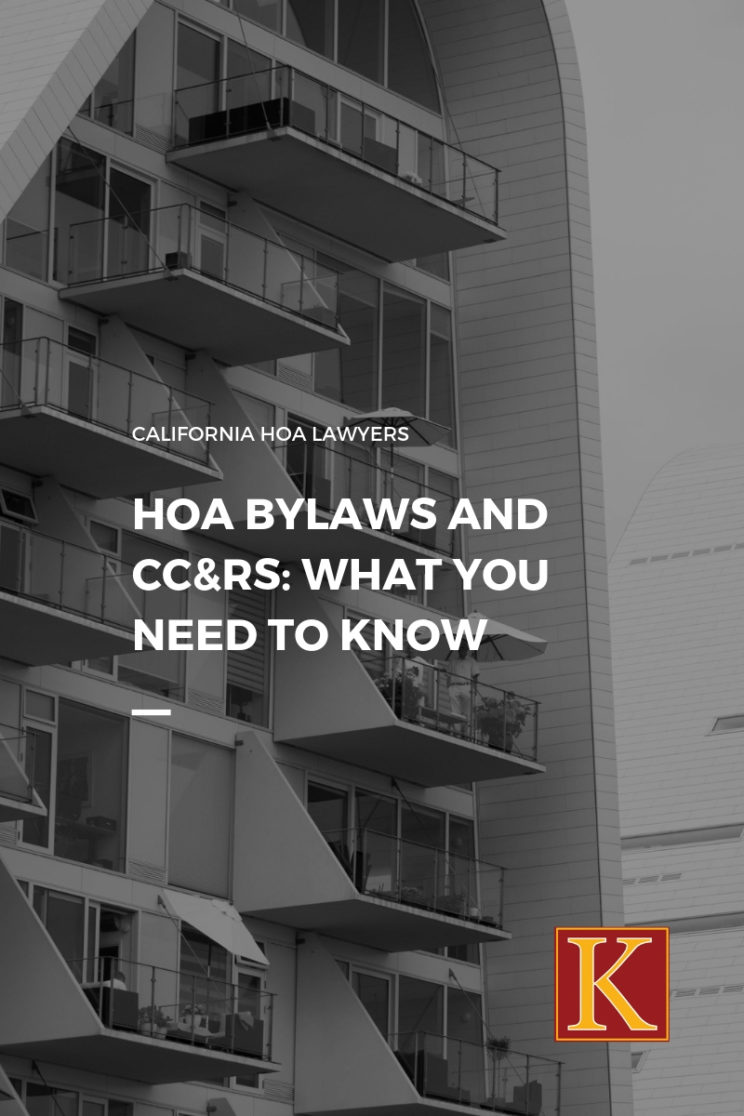HOAs otherwise known as Homeowners Association, will have its own HOA bylaws, rules and regulations, as outline in its Declaration of Covenants, Conditions, and Restrictions, or CC&Rs for short.
The CC&Rs act as the governing documents by which the HOA conducts its business, which is usually to ensure that the properties within the planned community have as high of a market value as possible. However, there are also bylaws to beware of, as there are some key differences between the HOA bylaws and the CC&Rs.
What is a CC&R?
To be clear, the CC&Rs serve as the legal binding document that outlines the guidelines for the planned community, as well as how all of the members within that community should conduct themselves.
CC&Rs are recorded and archived within the county records of whichever county the property is located. Basically, that’s all a really fancy way of saying that the CC&Rs are legally binding and getting out of it is extremely difficult since it gets recorded and reported to county officials. It also goes without saying that upon purchasing a home within a planned community, you automatically become a member of the homeowners’ association there, whether you like it or not.
California CC&Rs Restrictions and Laws
Put simply, the CC&Rs are the rules of your community. Those can include many differences protocols, regulations, and some of them can be very oddly specific (link here to the previous article).
For example, the CC&Rs may say that you need to keep your garage door shut or they might forbid you from painting your house a certain color. Basically, the CC&Rs tell you what you can and cannot do with your property because it is in a planned community.
Other things that CC&Rs frequently regulate include:
- Basketball hoops
- Fences or hedges
- Garbage cans or disposals
- TV antennas/satellite dishes
- Clotheslines
- Where you can park
- And much, much more…
California Homeowner’s Association Penalty Fees
As you can see, there are lots of things to watch out for in a CC&Rs since they can be so particular about what is and is not allowed. If you don’t heed the rules set forth by the CC&Rs, then the homeowners’ association can fine you penalty fees and potentially even force you to give up the house for frequent violations.
By The Way… Bylaws are Different
So, now that we have gone over what CC&Rs are… It’s time to tackle the other elephant in the room: HOA Bylaws. To do that, we have to first understand what an HOA is and how it is set up. A homeowners’ association is almost always established as a nonprofit corporation so that they can spearhead and manage private, planned communities.
Just as with other corporations, an HOA must be governed by a board of directors whom the members elect and a set of rules called bylaws must be written into effect.
What are HOA Bylaws?
The bylaws state how the HOA conducts its operations and business and they contain all of the information and details necessary to run the HOA as a business. Therefore, just like other businesses and corporations, HOA bylaws discuss matters like:
- When, where, and how often the HOA holds its meetings
- How the meetings are organized and carried out
- The duties and responsibilities of the offices of the board of directors
- How many people and positions are available on the board
- Members’ voting rights and how votes are conducted
As you can see, the HOA is filled with bureaucracy and much of its internal processes are very boring and time consuming. Of course, because it needs to be run by the people who are its members, that means that your neighbors within the planned community are all going to be present at these proceedings and meetings.
This can amount to quite a lot of neighborhood drama if people disagree upon which rules or laws to set or remove from the bylaws or CC&Rs. Therefore, as a minimum level of precaution we warn and strongly advise all of our clients who are considering purchasing a home in an HOA community to take some time and to familiarize themselves with both the CC&Rs as well as the bylaws of the HOA so that you can be aware of any neighborhood restrictions and prohibitions.
California HOA Lawyer
Contact our California homeowner association lawyer if you have a dispute with your HOA, HOA insurance claims, HOA penalty, adverse action taken against you by HOA for failing to follow California Homeowners’ Associations and CC&Rs, or any other HOA related matter.
We break down the details to you very clearly so you do not fall into a costly trap later and we can also help you fight some of the ridiculously restrictive rules and regulations of some CC&Rs. If you have any questions or concerns surrounding homeowners’ associations and the covenants, conditions and restrictions that they may come with, we highly encourage you to give us a toll free call at (310) 943-1171 to speak to our California homeowner association lawyers today.

